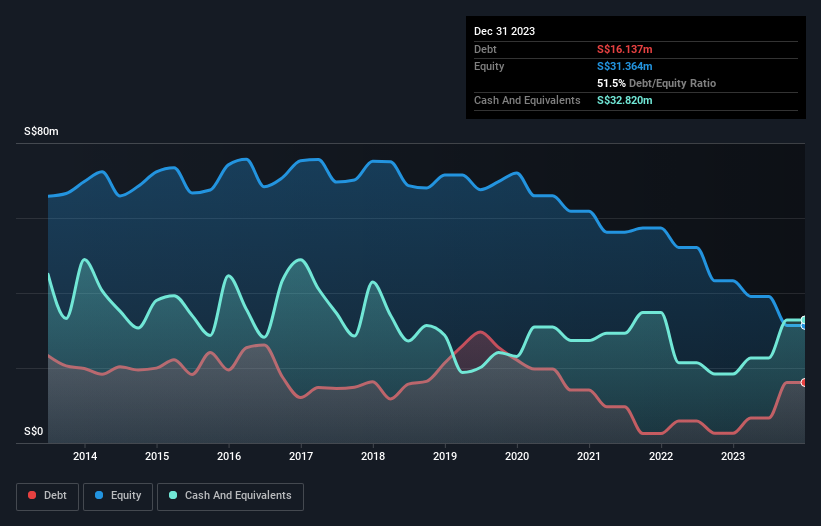Is TeleChoice International (SGX:T41) A Risky Investment?
Warren Buffett famously said, 'Volatility is far from synonymous with risk.' So it might be obvious that you need to consider debt, when you think about how risky any given stock is, because too much debt can sink a company. As with many other companies TeleChoice International Limited (SGX:T41) makes use of debt. But the real question is whether this debt is making the company risky.
When Is Debt A Problem?
Debt and other liabilities become risky for a business when it cannot easily fulfill those obligations, either with free cash flow or by raising capital at an attractive price. Ultimately, if the company can't fulfill its legal obligations to repay debt, shareholders could walk away with nothing. While that is not too common, we often do see indebted companies permanently diluting shareholders because lenders force them to raise capital at a distressed price. By replacing dilution, though, debt can be an extremely good tool for businesses that need capital to invest in growth at high rates of return. The first thing to do when considering how much debt a business uses is to look at its cash and debt together.
See our latest analysis for TeleChoice International
How Much Debt Does TeleChoice International Carry?
As you can see below, at the end of December 2023, TeleChoice International had S$16.1m of debt, up from S$2.58m a year ago. Click the image for more detail. But on the other hand it also has S$32.8m in cash, leading to a S$16.7m net cash position.

A Look At TeleChoice International's Liabilities
The latest balance sheet data shows that TeleChoice International had liabilities of S$93.7m due within a year, and liabilities of S$1.63m falling due after that. On the other hand, it had cash of S$32.8m and S$56.1m worth of receivables due within a year. So its liabilities total S$6.48m more than the combination of its cash and short-term receivables.
While this might seem like a lot, it is not so bad since TeleChoice International has a market capitalization of S$29.7m, and so it could probably strengthen its balance sheet by raising capital if it needed to. But it's clear that we should definitely closely examine whether it can manage its debt without dilution. While it does have liabilities worth noting, TeleChoice International also has more cash than debt, so we're pretty confident it can manage its debt safely. The balance sheet is clearly the area to focus on when you are analysing debt. But it is TeleChoice International's earnings that will influence how the balance sheet holds up in the future. So when considering debt, it's definitely worth looking at the earnings trend. Click here for an interactive snapshot.
In the last year TeleChoice International wasn't profitable at an EBIT level, but managed to grow its revenue by 2.4%, to S$238m. That rate of growth is a bit slow for our taste, but it takes all types to make a world.
So How Risky Is TeleChoice International?
While TeleChoice International lost money on an earnings before interest and tax (EBIT) level, it actually generated positive free cash flow S$11m. So taking that on face value, and considering the net cash situation, we don't think that the stock is too risky in the near term. With revenue growth uninspiring, we'd really need to see some positive EBIT before mustering much enthusiasm for this business. There's no doubt that we learn most about debt from the balance sheet. However, not all investment risk resides within the balance sheet - far from it. To that end, you should learn about the 3 warning signs we've spotted with TeleChoice International (including 2 which don't sit too well with us) .
Of course, if you're the type of investor who prefers buying stocks without the burden of debt, then don't hesitate to discover our exclusive list of net cash growth stocks, today.
Valuation is complex, but we're here to simplify it.
Discover if TeleChoice International might be undervalued or overvalued with our detailed analysis, featuring fair value estimates, potential risks, dividends, insider trades, and its financial condition.
Access Free AnalysisHave feedback on this article? Concerned about the content? Get in touch with us directly. Alternatively, email editorial-team (at) simplywallst.com.
This article by Simply Wall St is general in nature. We provide commentary based on historical data and analyst forecasts only using an unbiased methodology and our articles are not intended to be financial advice. It does not constitute a recommendation to buy or sell any stock, and does not take account of your objectives, or your financial situation. We aim to bring you long-term focused analysis driven by fundamental data. Note that our analysis may not factor in the latest price-sensitive company announcements or qualitative material. Simply Wall St has no position in any stocks mentioned.
About SGX:T41
TeleChoice International
An investment holding company, provides various info-communications services and solutions for the consumer and enterprise markets in Singapore, Indonesia, Malaysia, the Philippines, Hong Kong, and internationally.
Undervalued with excellent balance sheet.
Market Insights
Weekly Picks


Crazy Undervalued 42 Baggers Silver Play (Active & Running Mine)


Fiducian: Compliance Clouds or Value Opportunity?

Willamette Valley Vineyards (WVVI): Not-So-Great Value
Recently Updated Narratives


Positioned globally, partnered locally


When will fraudsters be investigated in depth. Fraud was ongoing in France too.


Staggered by dilution; positions for growth
Popular Narratives


MicroVision will explode future revenue by 380.37% with a vision towards success


NVDA: Expanding AI Demand Will Drive Major Data Center Investments Through 2026





